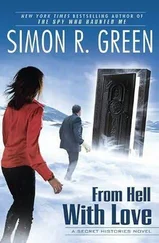“Wonder what they’re doing back in Oxford?”
“Probably just in for a meal,” said Agatha. “James and I often drove into Oxford for a meal. Do you think he likes her dressed like that?”
Megan Sheppard was wearing a short black dress with a white Peter Pan collar.
“She looks quite fetching, Aggie. She can get away with the girlish look.”
“Humph!”
“Oh, oh, he’s seen us and he doesn’t look too happy. He’s coming over.”
Sheppard loomed above them, clenching and unclenching his fists. “Are you following me?” he demanded.
“Why on earth should we do that?” said Charles mildly. “We’re having a meal here, just like you.”
He stood staring at them, his face dark with anger. Then he strode away. Agatha swivelled round to see what was happening. He bent over his wife, and then jerked her up by the elbow. He threw some money down on the table and then strode out of the restaurant, practically pulling his small wife after him.
“Now there’s a man with a guilty conscience,” said Agatha, turning back, her eyes gleaming.
“Have you ever thought that he might be perfectly innocent,” said Charles, “and that we frighten him?”
“Us? Why?”
“If you were questioned and then apparently pursued by two people, one of whom is married to the prime suspect and she herself is suspect number two, wouldn’t you get nervous?”
“Only if I had done the deed myself,” said Agatha stubbornly. “I swear that man’s a killer.”
“You had Dewey down as number-one suspect yesterday.”
“Oh, well, I mean, that was different.”
“How?”
“He was scary, telling us about threatening to take her eyes out. But I mean, striking someone with such a savage blow, like what happened to Melissa, is just the sort of thing Luke Sheppard would have done.”
“Don’t let your imagination keep running away with you. We have to dig up some hard facts. All we’ve got at the moment is speculation. We set out to find out all we could about Melissa. We felt sure if we really got to know her character, that would lead us to the murderer. But what have we got? A shifting, changing, manipulative woman who, quite frankly, could have been killed by anyone. And the main piece of the jigsaw is James. Without James, we haven’t a clue.”
“We’ll just need to go on, however,” said Agatha, “as if we’re never going to find James. You say, maybe if we clear his name and wherever he is, he reads it in the newspapers, he may come back.”
“To you, Aggie? Not still hoping for a happy marriage?”
“I just want to know that he is still alive,” said Agatha, staring down at her plate and not meeting his eyes.
“So what’s our next plan of campaign?”
Agatha racked her brain. She did not want to tell him she was at a dead end, in case he would pack up and go home and she would be left with her own company. What had happened to the old Agatha Raisin, who had not needed anybody? Maybe I did, she admitted ruefully to herself, and wouldn’t admit it.
Then her face cleared. “Of course. The hospital! At least as his wife I can ask the doctor what his condition was.”
“All right. We’ll go tomorrow.” Agatha heaved a sigh of relief. “But before we do, I think we should sit down and start to make notes, put everything in order. Oh, and then there’s Melissa’s sister, Julia. I really think we should make the effort and go to Cambridge to have another word with her. We’ve been looking at sex and passion and forgetting about the other prime motive, and that’s money.”
♦
Agatha was up early the next morning and anxious to leave for Mircester, but Charles insisted, “Notes first.”
Agatha switched on her computer. Her cats were in a playful mood that morning and were insisting on doing what cats like to do, namely jumping up on the keyboard and jumping on the keys. Charles carried them out into the garden and returned to sit down beside Agatha.
“Let’s start with Sheppard,” said Agatha. “He has a good alibi for the night of Melissa’s murder and that in itself is suspicious. Usually innocent people do not have any alibi. Motive? Mehssa may have known something about him that he did not want anyone else to find out.”
“So where does James come into it?”
“Rats! James. Well, Melissa might have tried to tell him that something. James flees after avoiding being killed.”
“So why not just kill Melissa and leave James alone?”
“I’ll never get anywhere if you insist on playing devil’s advocate.”
“All right. Go on.”
“Maybe Sheppard continued to hate her. Maybe – ”
“I’ve a thought. Maybe James does not know anything about Melissa’s murder. He shot off after he was attacked. He may have amnesia. He may not have read the papers.”
“You mean, if he’s alive, he may have information that would solve this case?”
“Something like that. Then what about what our genteel friend Miss Simms calls rough trade, Jake and his friends? She was sectioned for drugs. That’s it!”
“What’s what?”
“We ask the sister when she was sectioned, where, and what were the circumstances. Was she into really heavy mainlining stuff?”
“She certainly wasn’t on anything last time I saw her,” said Agatha. “No dilated pupils, no track marks on her arms. I really don’t think we’ve enough at the moment, Charles, to make notes. Please let’s go to the hospital.”
“I know you’ll never settle to anything until we do go. Come on, then.”
♦
Mircester General Hospital lay on the outskirts of the town, a gleaming modern building which had replaced the old Victorian hospital in the town centre, now a hotel. “Look at that!” said Agatha, outraged, as they drove into the hospital car-park. “We’ve got to pay for parking.”
“I suppose they’ve got to try to make any money they can, these days. I mean, you must remember when me National Health Service started, Aggie.” Agatha winced at this reference to her age. “It was going to be easy free treatment for everyone. Now it’s all breaking down. And the reason it’s breaking down, apart from sheer bad management, is all the new operations that everyone now expects – free hip replacements, free heart transplants, and all that costs a bomb.”
“I still think it’s a lousy trick forcing people to pay for parking,” muttered Agatha. “How long do you think we’re going to be?”
“Put in enough money for a couple of hours.”
With Agatha still complaining, they walked into me hospital. To their request to see the consultant or doctor who had diagnosed James Lacey, they were told to wait. And they did. They waited and waited. Agatha flipped nervously through pages of old Good Housekeeping magazines, barely taking in what she was reading. She was just about to approach the reception desk and make a very Agatha-type scene, when a tall, thin man in a white coat came up to them. “I am Dr. Henderson. I was a friend of James. I am so sorry, Mrs. Lacey. I gather there is no news?”
“I’m afraid not,” said Agatha. “I wanted to talk to you about his condition.”
“Come with me. I can spare you a little time.” He led them along gleaming hospital corridors to a small cluttered office. “Please have a seat. I can only tell you what you must know already, that he had a brain tumour. We were going to try chemotherapy. He was due for an appointment, his first treatment, when he disappeared.”
“What was his state of mind when you saw him?” asked Charles.
“He was deeply shocked and upset. He asked a lot about alternative methods. He was very interested in mind over matter. He had heard that in California they have tapes which you play which train you to combat the illness mentally. He also asked about diet. I said that miracles sometimes did happen, but that in his case, I could only recommend chemotherapy. I am afraid I do not believe in miracles.”
Читать дальше












